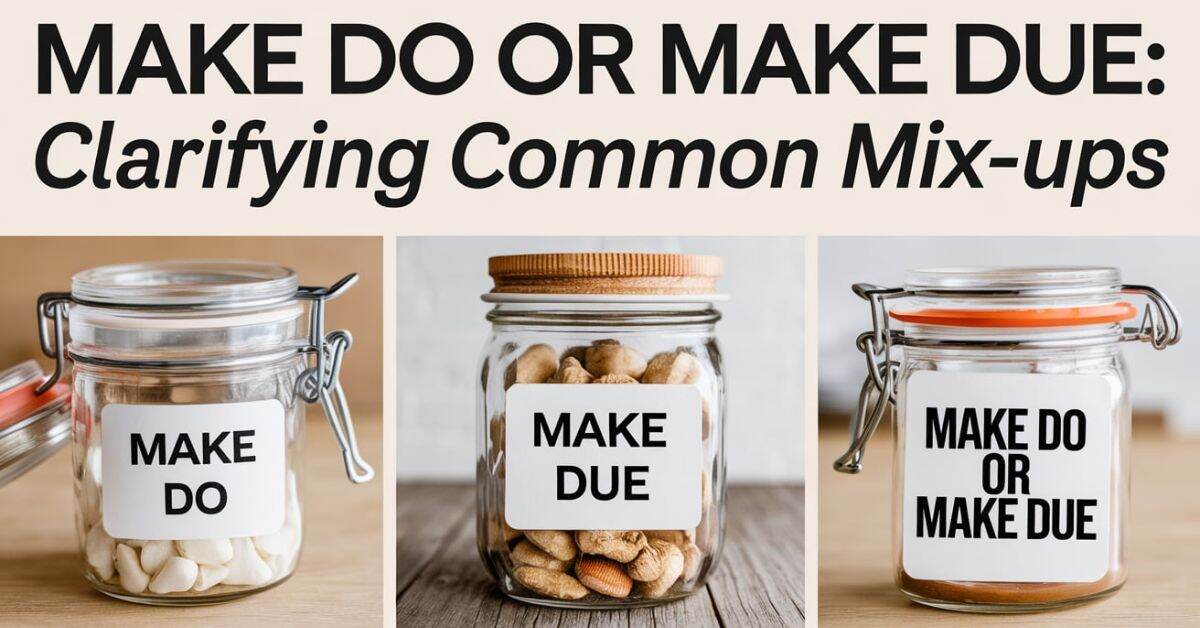Make do or make due Language can be tricky, especially when phrases sound similar but mean different things. “Make do” is a practical expression that means managing with limited resources. It describes how people adapt and improvise when they don’t have everything they need.
Have you ever found yourself in a situation where you had to work with what you had? Imagine being stuck with broken equipment or missing ingredients. This is exactly where the phrase “make do” comes into play, showcasing human creativity and resilience.
The confusion between “make do” and “make due” is a common linguistic mix-up that many people experience. These similar-sounding phrases can easily trip up even native English speakers. Understanding the correct usage can help you communicate more effectively and avoid potential misunderstandings.
Understanding the Difference Between Make Do or Make Due

Understanding the difference between “make do” and “make due” is essential for clear and accurate communication in English. While these two phrases may sound similar, they have distinct meanings and uses. “Make do” refers to managing with the resources available, even when they are not ideal.
While “make due” is a common mistake resulting from confusion with other phrases like “due to.” In this guide, we will explore the correct usage of “make do,” clarify why “make due” is incorrect, and help you avoid this common linguistic mix-up.
Why Language Precision Matters
Precise language is the cornerstone of effective communication. When we use phrases incorrectly, we risk misunderstandings that can impact our professional and personal interactions. The distinction between “make do” and “make due” might seem minor, but it speaks volumes about your language skills and attention to detail.
Make Do: Definition and Usage
What Does “Make Do” Really Mean?
“Make do” is a powerful English expression that captures the essence of human adaptability. It means to manage or cope with the resources available, even when they’re less than ideal. Imagine you’re cooking dinner and realize you’re missing a key ingredient – you’ll “make do” by finding a creative substitute or adjusting your recipe.
5 Synonyms for “Make Do”:
- Get by
- Manage
- Cope
- Improvise
- Adapt
Everyday Context of “Make Do”
Real-world scenarios bring the phrase to life. During economic challenges, people often “make do” with reduced income. In home repairs, you might “make do” with a temporary fix until a proper solution is available. It’s a testament to human resourcefulness – finding ways to succeed despite limitations.
Make Due: Definition and Usage
Is “Make Due” a Valid Phrase?
Let’s be crystal clear: “make due” is not a standard English expression. It’s a common grammatical error that stems from misunderstanding and misheard pronunciation. When people say “make due,” they’re typically intending to use “make do” or confusing it with the phrase “due to.”
5 Alternatives to Misusing “Make Due”:
- Due to
- Because of
- As a result of
- Owing to
- On account of
Avoiding the “Make Due” Trap
Recognizing and correcting this mistake is crucial. The phrase “due to” is used to explain reasons or causation, not to describe managing with limited resources. A quick mental check can help you use the correct expression every time.
Using the Right Term: How to Choose Between Make Do or Make Due

Practical Decision-Making Strategies
Here’s a simple approach to choosing the right phrase:
- If you’re talking about managing with what you have: use “make do”
- If you’re explaining a reason for something: use “due to”
- When in doubt, read your sentence aloud and ask if it sounds natural
Side-by-Side Comparison: Make Do or Make Due
| Aspect | Make Do | Make Due (Incorrect) |
|---|---|---|
| Definition | Manage with available resources | Grammatically incorrect |
| Correct Usage | “We’ll have to make do with this” | Not a standard phrase |
| Linguistic Origin | Implies improvisation | Misunderstood expression |
Grammar Rules and Examples
Make Do: Grammatical Insights
The phrase “make do” follows standard English grammar. It’s typically used with:
- Present tense: “We make do”
- Past tense: “They made do”
- Continuous form: “We are making do”
Practical Examples
- “During the power outage, we made do with candles and flashlights.”
- “She’ll have to make do with her old laptop until she can afford a new one.”
Frequently Asked Questions
What does the phrase “make do” mean?
It means to manage or get by with the resources currently available, despite them not being ideal.
When to use “do” or “due”?
Use “make do” when describing managing with limited resources.
Use “due to” when explaining reasons for something.
What is an example of “make do”?
“With limited kitchen supplies, we had to make do with a simple meal.”
Why is “make do” often confused with “make due”?
Similar pronunciation and lack of understanding about correct usage lead to this common mix-up.
Conclusion
Understanding the difference between “make do” and “make due” helps you communicate more clearly and confidently. The phrase “make do” means finding creative ways to work with what you have, even when things aren’t perfect. Whenever you face a challenge with limited resources, remember that “making do” is about being smart, flexible, and positive.
Language learning is a journey of continuous improvement, and mastering phrases like “make do” makes you a more effective communicator. By practicing the correct usage and understanding the subtle differences between similar expressions, you’ll sound more professional and articulate. “Make do” is more than just a phrase – it’s a mindset that demonstrates adaptability and intelligence in any situation.
With 5 years of experience in grammar, I, Admin, deliver accurate, clear, and reliable content. My expertise ensures top-quality insights in this niche.

